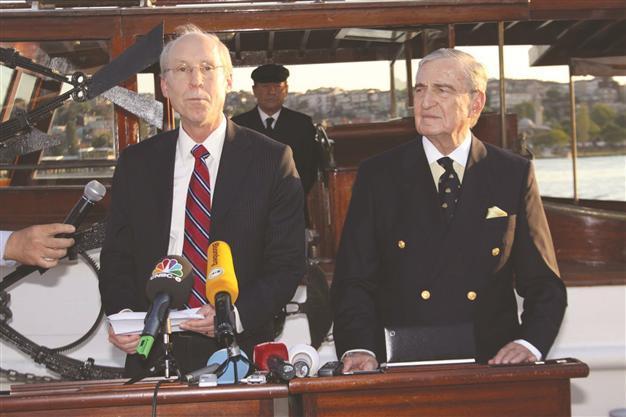An evaluation of Turkey’s 2023 targets from the private sector perspective
RAHMİ M. KOÇ

This file photo shows the honorary president of Rahmi Koç, (R) with US Consulate General Scott Kilner during a ceremony in Istanbul.
The year 2023 will mark the centennial of the Turkish Republic. For this date, the government has set the ambitious economic target of Turkey becoming the 10th largest global economy. This goal is accompanied by an export volume target of 500 billion U.S. dollars. The plan is to move from being categorized as a middle-income to a high-income country with a GDP per capita of 25,000 U.S. dollars. We trust that Turkey will live up to its full potential so that these targets may be reached.However, this is easier said than done.
The most important structural problem Turkey faces is its excessive reliance on foreign capital inflows in its growth model, which makes it difficult to attain a sustainable growth path. The domestic household savings rate is very low. Considering that private sector investments are around 18-20 percent of the GDP, insufficient levels of domestic savings leave us in need of foreign capital inflows to finance growth. In order to achieve the 2023 targets, the ratio of investments to GDP has to increase to 23-24 percent.
The priority should be to come up with new ideas that would help attain a sustainable growth trajectory. Further efforts are needed to strengthen the financial markets in Turkey and improve financial literacy so that an increased portion of savings may be channeled into the financial system. Establishing a competitive manufacturing footprint should be another key priority for policy makers.
Turkey has to implement a series of micro-reforms in order to enhance the global competitiveness of its economy. It is essential to improve conditions in areas where there is a potential to enhance overall efficiency. The factors important for enhancing efficiency are higher education and training, quality and productivity in the labor market, improved financial markets, technological readiness, and market size.
Turkey is already a large market; hence, market size is not a factor that hinders its competitiveness. However, according to a comparative analysis of global competitiveness and productivity, it is apparent that further actions are needed in health and education.
Another area where there is substantial room for development is improving efficiency in the labor market. Some of the most problematic issues are the very low levels of female labor force participation, rigidity of employment, high redundancy costs, and improper linkage of pay to productivity.
Turkey still does not fully enjoy an institutional framework that can enhance productivity and hence, competitiveness. Turkey needs to tackle the issue of insufficient protection of property rights, especially intellectual ones, the need to improve the general judicial system, the continued presence of heavy bureaucracy and high levels of red tape.
Turkey needs progress in permanently bringing down inflation and interest rates below the 5 percent level, decreasing the share of Turkey’s unregistered economy in order to provide a fair playing ground for both domestic and foreign investors, promoting policies to support investments in high value-added products, promoting policies to increase the share of high-tech exports, promoting energy efficiency in order to decrease dependency on imported raw materials.
Implementing policies to broaden the tax base, increase efficiency in tax collection, and decrease the share of indirect taxes in the total tax collection, as well as promoting policies to increase investment in R&D, are also very important.
As a conclusion the efforts of the government and the business community can only bear fruit if Turkey can ensure political stability and social cohesion within a world-class democracy where individual rights are guaranteed through a properly functioning legal system. In order to achieve this, the culture of consensus among Turkey’s political elite should be improved, especially in regards to very crucial issues such as the new constitution, which is in the process of preparation. Turkey can achieve its goals for 2023 and beyond only if it emerges as a stable and mature democracy that provides the necessary background for a successful economy and a thriving business community.
* Rahmi M. Koç is the Honorary President of the Board of Directors of Koç Holding A.Ş. This article is originally published in the Summer 2013 issue of Turkish Policy Quarterly (TPQ).
For more information, please visit www.turkishpolicy.com











